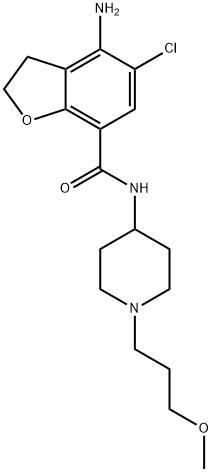Prucalopride is a potent and selective agonist of the serotonin (5-HT) receptor subtype 5-HT4 (Kis = 2.5 and 8 nM for human 5-HT4A and 5-HT4B, respectively). Prucalopride is greater than 250-fold selective for 5-HT4 over a panel of 53 overexpressed receptors, including 5-HT subtypes, but does bind to human dopamine D4 and sigma-1 (σ1) receptors and mouse 5-HT3 receptors (Kis = 2.3, 3.7, and 3.8 μM, respectively). It induces contractions in guinea pig colon with an EC50 value of 33 nM, an effect that is blocked by the 5-HT4 antagonist GR113808 but not the 5-HT2A and 5-HT3 antagonists ketanserin and granisetron , respectively. It also facilitates non-cholinergic contractions induced by electrical stimulation. In fasted dogs, oral administration of prucalopride increases colonic motility by inhibiting distal colon contractions (ED50 = 0.04 mg/kg), an effect that is blocked by pretreatment with the 5-HT4 antagonist GR125487. Prucalopride (5-10 mg/kg, s.c.) increases acetylcholine and histamine levels in the rat prefrontal cortex by 2.4-fold and 3-fold, respectively, and increases the power of hippocampal theta oscillations. Formulations containing prucalopride have been used in the treatment of chronic idiopathic constipation.




